
Related
Topics
Venezuelan President Hugo Chavez survived a referendum to recall him Sunday as voters turned out in record numbers. Opposition leaders have rejected the result as a fraud. We go to Caracas to get a report from the streets and we speak with Pacifica journalist Mario Murillo in Colombia about the wider impact of the vote on the region. [includes rush transcript]
Venezuelan President Hugo Chavez has survived a referendum to recall him, according to preliminary results released by the country’s top electoral officer.
The President of the National Electoral Council announced in the early hours Monday, that with 94% of the ballots counted, Chavez had won just over 58% of the vote, while the vote to recall him obtained nearly 42%. He said the results meant Chavez should remain in office until the end of his six-year term in January 2007.
Following the news, a triumphant Chavez appeared on the balcony of the presidential palace and sang to thousands of flag cheering supporters.
But opposition members on the electoral body rejected the partial result as a fraud, claiming their side had won.
Opposition leader Henry Ramos Allup told a news conference “We’re going to collect the evidence to prove to Venezuela and the world the gigantic fraud which has been committed against the will of the people.” He said they were waiting to hear the verdict of international observers, including former US President Jimmy Carter and the Organization of American States who monitored the referendum and so far have appeared satisfied.
Millions of voters turned out in record numbers for Sunday’s recall referendum prompting voting hours to be extended twice. International interest in the outcome was high given Venezuela’s importance as one of the world’s biggest oil exporters.
This is the eighth time Chavez’s mandate as leader has been approved since 1998, after two presidential elections and six referendums. Chavez supporters criticize the U.S. for supporting a failed coup attempt against the president in April 2002. Chavez was removed from power by a coalition of military officials and business leaders but returned to office two days later.
- Martin Sanchez, editor of Aporrea.org, main grassroots website for Chavez supporters and co-editor of the news site Venezuelanalysis.com. He joins us on the phone from Caracas.
- Mario Murillo, Pacifica journalist and author of the new book Colombia and the United States: War, Terrorism and Destabilization. He teaches media and communications and is co-host of Wake-Up Call on the Pacifica radio station WBAI in New York.
Transcript
AMY GOODMAN: We are joined right now by Martin Sanchez, webmaster of venezuelanalysis.com and aporrea,.org, the main grassroots website for Chavez supporters. He joins us on the phone from Caracas. Welcome to Democracy Now!
MARTIN SANCHEZ: Good morning, Amy.
AMY GOODMAN: It’s good to have you with us. Can you talk about this last 24 hour and the preliminary results of this vote?
MARTIN SANCHEZ: Yeah, well, actually, a lot of people who are linked to grassroots movements and people in the opposition haven’t gotten any sleep in the last two days because of the expectancy with the votes. Last night, we waited for Chavez to speak from outside the presidential palace. There was some rain, so as you can imagine a lot of people are tired here, but jubilant for Chavez’s triumph.
AMY GOODMAN: Can you talk about how the vote went, and — the voting polls were supposed to close yesterday at 4:00?
MARTIN SANCHEZ: Yes. There were several problems with the installation of the voting machines. This time Venezuela is using electronic voting machines in an effort to prevent the old parties which have a big machinery of fraud to manual ballots. So, they set up these electronic voting machines which actually have not been tested in previous elections, so the way the operation went is that the government hired the local telecom company, CANTV, which is actually owned by GTE, AT&T and Spanish Telefonica, and they hired another U.S. company, SmartMatic, which programmed the voting machines. It was all in charge of contractors of private companies. It was beyond a control of the national electoral council. So, what ended up happening is that many of the technicians showed up late. They were supposed to show up at 5:00 a.m. in order to guarantee that the machines — the voting centers will be opened by 6:00, and many voting centers ended up open by 10:00 a.m., so that delayed the start of the vote, and that caused huge lines. Actually, the fact that there was an unusual high voter turnout just overwhelmed the expectations of the national electoral council, which wasn’t expecting so many people to go out to vote.
AMY GOODMAN: Martin Sanchez talking to us from Caracas. Do you know who owned the new voting machines, these electronic voting machines?
MARTIN SANCHEZ: Yes. The electronic voting machines —
AMY GOODMAN: Or who made them?
MARTIN SANCHEZ: Were made by Olivetti from Italy, but they were programmed by this Florida-based company called SmartMatic. So the whole operation is put in the hands of two companies with U.S. capital, so a lot of people in the grassroots movements were criticizing the government for — two months ago President Chavez declared that his government has entered into a imperialist period, but at the same time, the national electoral council hires two U.S. companies to take care of deciding the people’s will in Venezuela.
AMY GOODMAN: Can you say the name again of the company that made the voting machines?
MARTIN SANCHEZ: It’s SmartMatic.
AMY GOODMAN: We’re also joined on the telephone by Mario Murillo, a Pacifica reporter, long-time journalist. His new book is called Colombia and the United States: War, Terrorism and Destabilization. He teaches media and communications in Long Island at Nassau Community College — Nassau Community College, Mario?
MARIO MURILLO: It’s actually Hofstra. Hofstra University.
AMY GOODMAN: Hofstra. Hofstra. And co-host of “Wake-Up Call” on Pacifica station WBAI in New York. Speaking to us from Colombia, from Bogotá. Welcome to Democracy Now!, Mario.
MARIO MURILLO: It’s great to be with you, Amy.
AMY GOODMAN: So are people in Colombia watching the results in Venezuela?
MARIO MURILLO: Yeah. Clearly, it’s been the number one story I would say for the last week really here, almost surpassing some of the other internal crises that have been going on here in Colombia, and certainly over the last 48 hours, it’s been the number one story. Local television news has been breaking in with hourly updates all day yesterday. They were even cutting into Venezuelan television to present the coverage there. So people here in Colombia have been watching very closely the developments in Venezuela.
AMY GOODMAN: Can you talk about the connection between Venezuela and Colombia? Even draw the map for us for starters, because I think a lot of people do not have a sense of the geography of South America.
MARIO MURILLO: Well, Venezuela and Colombia share a border, a very long border in the northern part of South America. They’re always considered — the two are kind of economic and political powers of the northern part of South America, and their relationship for many years has always been kind of friendly, but there has also been some tensions. I would say certainly in the last six years since Chavez has been in office, and certainly over the last two years since President Alvaro Uribe has been in power here in Colombia, the relations have never been worse in the countries’ history. I think a lot of you has to do with what we can describe and I don’t think it’s unfair to describe the two tendencies, in other words, Uribe and Chavez as the two most radical ideological perspectives coming out of South America today. On the one hand, you have Chavez, who is as we know a very strong campaigner against neo-liberalism and against the Free Trade Area of the Americas. He has been a very vocal critic of the United States’ Plan Colombia. He has been very critical of the war in Iraq, et cetera. He has been a thorn in the side of Washington for many years. On the other side of the border, you have the President Alvaro Uribe, who is perhaps the closest president Colombia has ever had to the United States, close friends with President Bush, has supported every step of President Bush’s war on terrorism, was the only president in the whole continent to support the war in Iraq and clearly a person who looks at the United States as the main kind of protector of his political platform.
AMY GOODMAN: Mario, I want to talk about what this might mean for Uribe’s re-election, but we have to break for stations to identify themselves. Mario Murillo speaking to us from Bogotá, Colombia, about the wider impact of the Hugo Chavez victory over the recall referendum. And we’re speaking with Martin Sanchez in Caracas, Venezuela. Stay with us. [break] Democracy Now! The War and Peace Report. Again, the latest information out of Venezuela, the preliminary results with more than 94% of the precincts reporting, that the president of Venezuela, Hugo Chavez has prevailed in the recall referendum against him. We’re joined on the phone by Martin Sanchez, who is the news site editor of venezuelanalysis.com and aporrea.org, the main grassroots website for Chavez supporters. And Mario Murillo is speaking to us from Bogotá, Colombia, Pacifica reporter, professor at Hofstra in Long Island, author of the new book Colombia and the United States: War, Terrorism and Destabilization. You were talking about the relationship between Chavez and Uribe, and Uribe and President Bush. What would this mean for Uribe in the next election?
MARIO MURILLO: If the results stand up, as we have been pointing out, obviously the opposition has problems with the result, and they’re going to probably make quite a lot of stink over the next couple of days. But as those election results hold up, President Uribe, he has to take a step back and consider in a sense a rejection of some of the policies that he has promoted. One thing that I think should be pointed out is that earlier this year, a couple of months ago there was indications that rightwing paramilitary Colombian-trained and rightwing paramilitaries were inside Venezuela attempting to create the conditions for kind of an attack against the Chavez government. That was kind of egg in the face for President Uribe. Of course the Colombian government distanced itself from that, but if they can embark in talks with the right wing paramilitaries here in Colombia to try to demobilize them and insert them into so-called legitimate institutions, it created quite a negative fallout for the Uribe administration. I think the victory of Chavez also puts into question Uribe’s position, first of all, because of the large turnout. I mean, I think there was 35% abstention in Venezuela, which is unprecedented in recent history. You know, this is the third time that — well, the eighth time overall, but the third time it was direct support for Chavez as — in terms of his presidency whereas Uribe when he was elected in 2002, the abstention rate in Colombia was at 55% and he certainly did not have nowhere near the kind of support that Chavez seems to have gotten in the latest round here. However, Uribe right now, his main focus, his main experiment is to try to push forward a constitutional amendment, a congressional act that would actually allow for re-election here in Colombia, and in fact what we’re seeing unfold right now, and in fact this week here in Bogotá, you are seeing the two sides, the opponents to Uribe and the re-election campaign and the supporters of Uribe kind of mobilizing the same way that we saw over the last 12 months in Venezuela. It’s going to become very polarized and Uribe is going to certainly push, to the extent that he can, the campaign for re-election. To the chagrin and to the concern of a lot of people here who are watching carefully and a lot of concern, the role that the Uribe administration has played in the negotiations with the rightwing paramilitaries basically giving them a green light to carry out political assassinations in certain parts of the country, to talk before the congress as occurred two weeks ago when the leaders of the rightwing paramilitaries spoke before the Colombian congress, without any concessions whatsoever to the Colombian government, to the victims of the — thousands and countless victims of paramilitary terror here, all of this is being supported by Uribe to try to bring peace supposedly and stabilization to the country, but human rights activists, people in the opposition, the political opposition are very much concerned about what a re-election could mean for Colombia, if Uribe gets another four years in office.
AMY GOODMAN: Martin Sanchez, finally, in Caracas, what does this mean now for the opposition, and for the supporters of Hugo Chavez, who clearly looks like has just prevailed in this recall referendum as we talk about the two major oil producing countries in South America, Venezuela, and Colombia?
MARTIN SANCHEZ: Well, yeah, first, I have to mention that there’s a Colombian connection to the negotiations that went on last night. Actually, the delay in the elections results from the national electoral council was related to the fact that both the Carter Center and the Organization of American States, which are officers of the elections here, were trying to convince the opposition to accept the results of the Chavez’s victory, but it’s been said that actually the O.A.S. president, Cesar Gaviria which is a Colombian ex-President actually was supporting the opposition and did not want to acknowledge Chavez’s victory, so this is not —- this is an unconfirmed report, this is just from international observers who were close to the negotiations. There you have a Colombian connection. Gaviria will be replaced next month as the O.A.S. president, but he has been a person who has been instrumental in breaking deals between the government and the opposition in Venezuela, and the other fact is that the opposition has now recognized the election results, and it has said that the government committed fraud and as you said at the beginning, they’re going to do some legal procedures to try to block the election results. So, I think that for the Venezuelan opposition, this—-they actually burned their last —- they fired their last shots to try to oust Chavez to a constitutional way, and it seems like they don’t have enough support in the military to try to trigger another coup as they did in 2002. So, I think that for the opposition, it’s all downhill for now and they have to concentrate on building a platform to run for the elections in 2006. One of the main witnesses of the opposition in Venezuela, is they haven’t presented a clear platform to run against Chavez. They don’t have a clear leader who—-Chavez remains the most popular leader, political figure in Venezuela with up to 40% of the advantage over the nearest competitor from the opposition. So, the opposition will have to concentrate on getting a program ready and trying to rebuild the prestige that they have lost because of the rule in the country the last four years and laundering the oil money which Chavez is using to help the poor.
AMY GOODMAN: Martin Sanchez, I want to thank you for being with us from Caracas, again website apporea.org, the main grassroots website for Chavez supporters. Also, Mario Murillo, speaking to us from Bogotá, Colombia. His book, Colombia and The United States: War, Terrorism and Destabilization.

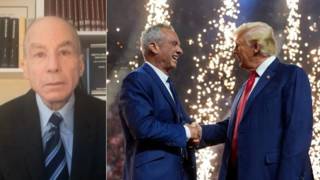
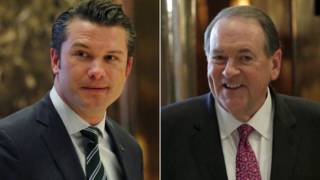

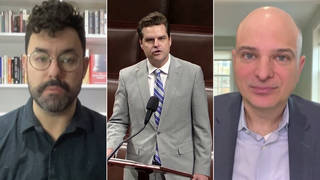





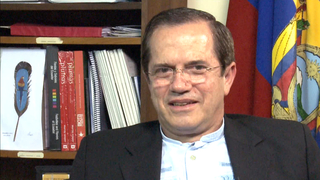
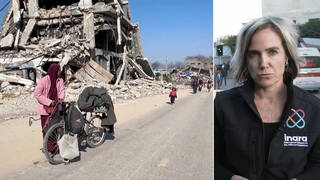
Media Options